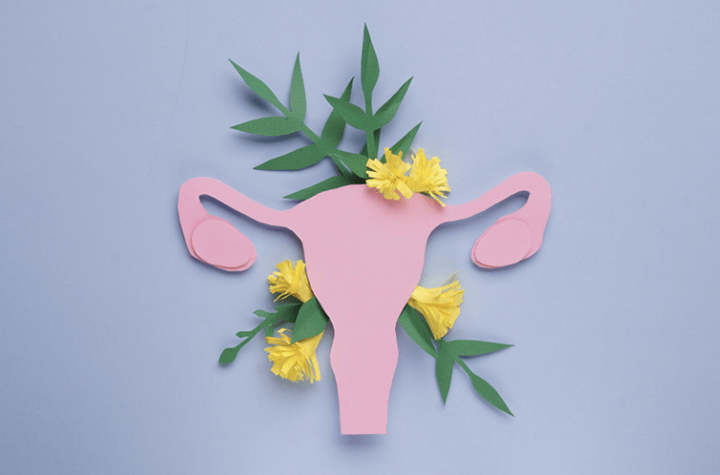Perimenopause marks the beginning of the process women’s bodies go through when they are losing their monthly period. This natural yet challenging time for women involves physical and emotional symptoms that can make daily life overwhelming and difficult. We teamed up with Womco, the digital hormonal health care app for women, to share strategies for women in the childcare sector to help reduce symptoms and raise awareness of perimenopause in the workplace.
About the menopause expert

Annabel de Gheldere (co-founder and CEO of Womco) is passionate about women’s health and the lack of scientific, supportive research and resources available. Womco was designed to allow companies to take an active stance on supporting their female employees. If you didn’t already know, the statistics will show just how important menopause awareness is.
What is the perimenopause?
The perimenopause can start months or even years before a woman’s periods stop. Once monthly cycles have stopped, this is known as the menopause. Spanning 40 known symptoms, the perimenopause affects each woman differently. Some women may notice extreme changes physically and mentally, whilst others experience milder symptoms.
Perimenopause often affects women between the ages of 45-60 years old. However, it can affect any women who have a monthly period, including women in their 30s and early 40s. Sometimes, the reason for early menopause is unknown. Symptoms of perimenopause can also cross over several ovarian-related conditions, like PCOS. Annabel advises women to be aware of what is normal for them, tracking any changes to monthly cycles carefully and knowing what the signs of perimenopause are.
Perimenopause is a challenging time in women’s lives, with 62.7% of women finding it difficult to manage. Let’s look into the signs and symptoms of perimenopause a little more.

What are the signs of perimenopause?
Many women do not feel informed of what to expect with the menopause. With hot flushes and night sweats being the best-known symptoms of perimenopause, many signs can go unnoticed, leaving women to struggle without the necessary support.
It is not surprising to hear that more than 90% of women were not taught about the signs and symptoms of menopause during their school education. With over 68% of women only discovering more about perimenopausal symptoms once their symptoms had started, being proactive about raising awareness of ‘the change’ is essential to give women the support they deserve when managing menopause in the workplace.
There are over 40 signs and symptoms of perimenopause. Annabel explains that women are often unaware that their increased fatigue, irritability and emotional changes may be due to perimenopausal changes to the body. Leading women to unknowingly suffer in silence due to the absence of support, education, and knowledge can lead to mental health impacts and even early retirement from the childhood sector.
Here is a selection of the most commonly experienced perimenopausal symptoms:
- A change in the normal pattern of monthly periods.
- Changes to mood and self-esteem.
- Concentration and memory issues (known as brain fog).
- Hot flushes.
- Night sweats and difficulty sleeping.
- Heart palpitations.
- Headaches and migraines.
- Weight gain.
- Reduction in sex drive.
- ncreased Urinary Tract Infections (UTIs)

How does the menopause affect women in EYFS?
EYFS settings are a unique working environment for women of all ages. The female-dominated dynamic found in the early years should be used to the advantage of women’s mental health and hormonal needs.
EYFS settings have the opportunity to pave the way for other employment fields in supporting their employees with female health and menopause in the workplace. Annabel remarks on how employers are far-far down the list of avenues of support for women. EYFS settings have an opportunity to increase conversation, knowledge, and resources for their female staff.
How can perimenopause impact nursery managers and owners?
Nursery managers and owners are juggling a variety of EYFS-related plates each day. With high accountability, responsibility, and a never-ending task list, EYFS managers and owners must be on their A-game to run a successful nursery business.
There are a number of ways perimenopause may cause nursery owners and managers additional stress and difficulty with the day-to-day running of a childcare setting.
Administrative tasks take up a large part of nursery manager’s daily activities, It can be easy to forget to send a payment reminder, incorrectly calculate the hours used in the week or forget about the additional session a parent asked you for in passing. Use strategies and tools to help you stay ontop of your workload.
Keeping regular reminders and alarms set for important meetings or events can reduce the number of forgotten tasks, positively impacting your mental load.
Any task that can impact meeting statutory requirements cannot be left to chance. If recovery days are needed due to symptoms of menopause, knowing each nursery room will remain in ratio due to occupancy planning can take one task off nursery managers and owners’ shoulders.

How can perimenopause impact nursery practitioners?
It is an understatement to describe a nursery practitioner’s day as busy. They are on the go from the beginning of the day all the way to pick-up (not forgetting the end-of-day admin). Many of the experienced symptoms of perimenopause can make an intense day almost unbearable.
Nursery practitioners may be experiencing:
- Extreme fatigue.
- Brain fog.
- Hot flushes during the nursery day.
- Memory challenges.
- Increased irritability.
- Lower self-esteem.
Preparing how best to plan for and support women experiencing these symptoms benefits the individual’s mental health and well-being and the smooth operation of the childcare business.

Expert advice for perimenopausal women
Annabel reassures women that they are not alone in feeling helpless and overwhelmed when they try to balance their physical and mental changes with the working world. There are several strategies women can try to reduce the impact perimenopausal symptoms have on their working and personal lives.
Track menstrual changes effectively
Knowing what your ‘normal’ looks like is important to notice even the slightest changes in your period patterns and frequency of symptoms. Tracking menstrual information and feelings can be invaluable when taking the next step to speak to menopause experts or your GP.
Effective diet and nutrition for perimenopause
Diet and focused nutrition can significantly reduce some symptoms of menopause in women. Breaking the cycle of grabbing a quick bite to eat during a busy working day or an easy meal after a long day at the nursery is important. Access to personalised nutritional advice and recipes can take the hassle away from meal prep inspiration for practitioners.
Research and training around menopause in the workplace
With the lack of resources and research available for women surrounding perimenopause, it is important to find accurate and trusted information to help educate women on what to expect. Seeing all female-health information in one place can help busy practitioners who don’t have time to go into endless research when they should be relaxing.
Increasing exercise helps to manage menopause in the workplace
Finding free exercise ideas tailored to all different fitness levels can take time and effort. Free online training videos that can be completed in less than 7 minutes make exercise more likely to happen after a busy day. Free online women’s health videos like LWRFitness help women reduce cholesterol, lose weight and improve mood. Joining a supportive fitness network can help practitioners include active and purposeful movement throughout their day, removing the daunting prospect of starting from scratch alone.
Rest and the menopause
Women experiencing perimenopausal symptoms can often find their sleep is affected. Adopting healthy sleep strategies can help practitioners switch off from their busy day. You may want to share the following ideas with your team:
- Stretching and yoga.
- Audiobooks to aid sleep.
- A warm bath before bedtime.
- Limited time on mobile devices before bedtime.
- Restricting large meals to dinner time and avoiding bedtime.
- Exercise throughout the day.
How nursery employers can help women with perimenopause
There are many different ways that employers can support women experiencing perimenopausal symptoms (and to prepare other women in advance).
Raise awareness of menopause and its symptoms, encouraging practitioners to discuss their concerns and build a supportive network within your childcare setting. You may want to offer families the opportunity to seek support from your nursery, encouraging mothers, grandmothers and other important female family members to join in with menopause workshops and training.
Joining local EYFS settings to create a network of nursery managers can be beneficial when discussing policies and procedures for supporting menopausal staff members. Many settings are now implementing policies and strategies to raise awareness and recognise the impact this change has on female practitioners.
Be mindful of staff room treats when supporting perimenopausal women; chocolates and sweets will not positively impact a balanced diet to reduce symptoms.
Consider integrating women’s health apps into your practitioner’s benefit package. At a time when EYFS recruitment is so challenging, championing women’s health can be an attractive quality when practitioners are looking to move from their current settings.
Be aware of the occupancy, staff planning and ratio systems in your EYFS setting. Is it easy to confirm each nursery room is within ratio should a staff member call in sick? Or would it significantly increase administrative demand and workload for nursery management to rearrange the staff rotas to accommodate?